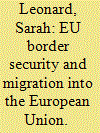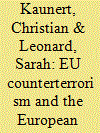|
|
|
Sort Order |
|
|
|
Items / Page
|
|
|
|
|
|
|
| Srl | Item |
| 1 |
ID:
116684


|
|
|
|
|
| Publication |
2012.
|
| Summary/Abstract |
This article focuses on the financial sanctions adopted by the European Union (EU) against individuals suspected of involvement in terrorist activities. This sanctions regime has been sharply criticised for its negative impact on human rights and has seen several judicial challenges before the European Courts. In contrast with most of the existing literature, which focuses on legal issues or examines the consequences of the EU financial sanctions, this article takes a step back to examine the reasons for which the EU decided to adopt these controversial financial sanctions in the first place. This article argues that it is mainly its commitment to 'UN-centred effective multilateralism' that has led the EU to adopt these financial sanctions measures in order to align itself with the UN financial sanctions regime. However, the Kadi landmark ruling of the European Court of Justice (ECJ) has challenged the pre-eminence of multilateralism over other considerations, such as the respect for human rights. As the Court of Justice prepares to hand down its second judgment in this case, the EU is left torn between its commitment to multilateralism and its commitment to human rights, which can be fully reconciled only if the UN sanctions regime meets the EU's human rights standards.
|
|
|
|
|
|
|
|
|
|
|
|
|
|
|
|
| 2 |
ID:
101141


|
|
|
|
|
| Publication |
2010.
|
| Summary/Abstract |
This article examines the contribution of the activities of FRONTEX, the Agency in charge of managing operational cooperation at the external borders of the European Union (EU), to the securitisation of asylum and migration in the EU. It does so by applying a sociological approach to the study of securitisation processes, which, it argues, is particularly well-suited to the study of securitisation processes in the EU. Such an approach privileges the study of securitising practices over securitising 'speech acts' in securitisation processes. After identifying two main types of securitising practices in general, the article systematically examines the activities of FRONTEX and the extent to which they can be seen as securitising practices on the basis of these two (non-mutually exclusive) criteria. The article shows that all the main activities of FRONTEX can be considered to be securitising practices. The article therefore concludes that the activities of FRONTEX contribute to a significant extent to the ongoing securitisation of asylum and migration in the EU. It also highlights that this does not automatically make FRONTEX a significant securitising actor in its own right and that more research is needed on the relations between FRONTEX and the EU institutions, especially in the light of the current negotiations aiming to amend the founding Regulation of FRONTEX.
|
|
|
|
|
|
|
|
|
|
|
|
|
|
|
|
| 3 |
ID:
103801


|
|
|
|
|
| Publication |
2011.
|
| Summary/Abstract |
Terrorists trained on European soil, but originating from the Middle East, attacked the world's only superpower on September 11, 2001. Countering this terrorist threat has become an increasingly significant part of European Foreign Policy. At the same time, the European Neighbourhood Policy (ENP) has become an increasingly important dimension of European Foreign Policy. This article examines the extent to which counterterrorism has occupied a prominent place in the ENP, with a particular focus on the Southern Mediterranean ENP partners. The findings of this article suggest that, despite the commonly held view in the literature that security issues, in particular terrorism, have dominated the ENP agenda, counterterrorism cooperation between the European Union (EU) and its Southern Mediterranean ENP partners has not advanced as much as might have been expected.
|
|
|
|
|
|
|
|
|
|
|
|
|
|
|
|
| 4 |
ID:
116194


|
|
|
|
|
| Publication |
2012.
|
| Summary/Abstract |
The construction of the Area of Freedom, Security and Justice has seen the pooling of a significant amount of national sovereignty at the European Union (EU) level through the establishment of internal EU competences. This process has also had the important side-effect of an increasing development of an EU interest in various areas of security, including in counter-terrorism. This article examines the processes through which the EU interest in counter-terrorism is constructed. It argues that, in line with social constructivist literature, it is important to conceptualise interests as being mutually constituted through interactions amongst political actors. It further develops two arguments in this respect. First, the United States (US) has exercised significant influence on the shaping of the EU interest in counter-terrorism. This point is particularly well-illustrated by the Passenger Name Record case. The second argument put forward by this article is that the process through which the EU interest is shaped has become increasingly complex, in particular following the entry into force of the Lisbon Treaty, which reinforced the powers of the European Parliament. A particularly apt illustration of this argument is the case of the SWIFT (Society for Worldwide Interbank Financial Telecommunication) Agreement.
|
|
|
|
|
|
|
|
|
|
|
|
|
|
|
|
|
|
|
|
|